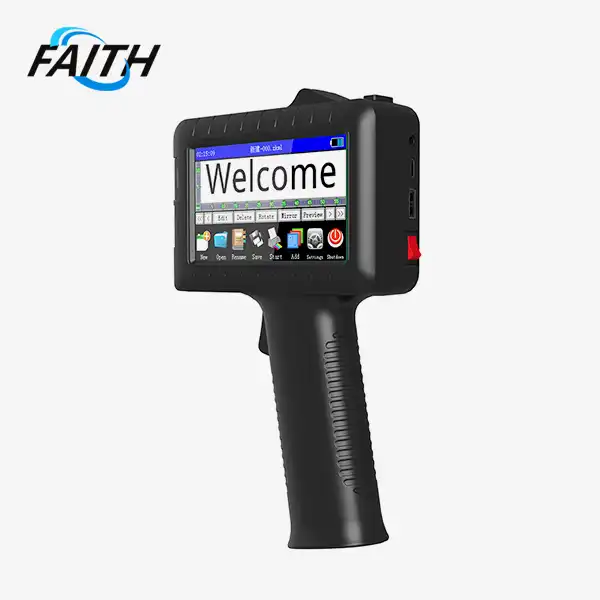Small Character Inkjet Coders: The Future of Packaging Technology
Small character inkjet coders are revolutionizing the packaging industry with their versatility and efficiency. These innovative devices are becoming indispensable in modern packaging technology, offering high-speed printing capabilities, adaptability to various surfaces, and seamless integration with automation systems. As we move towards a more connected and traceable supply chain, small character inkjet coders are at the forefront, enabling businesses to print critical information like barcodes, expiration dates, and batch numbers on a wide range of packaging materials with unprecedented precision and speed.
The Evolution of Packaging Technology: Rise of Small Character Inkjet Coders
The packaging industry has undergone a significant transformation in recent years, driven by the need for more efficient, accurate, and versatile marking solutions. Small character inkjet coders have emerged as a game-changing technology, offering a perfect blend of speed, precision, and adaptability. These devices utilize advanced inkjet technologies, primarily Continuous Inkjet (CIJ) and Thermal Inkjet (TIJ), to deliver high-quality prints on various substrates.
CIJ technology, in particular, has shown remarkable adaptability to the evolving demands of modern packaging. It can handle a wide array of materials, from traditional plastics and metals to more sustainable packaging options. The ability to print on eco-friendly materials aligns perfectly with the growing emphasis on sustainability in the packaging industry. Moreover, CIJ printers can easily accommodate 2D codes, enhancing product traceability and meeting the increasing demand for detailed product information.
TIJ printers, on the other hand, offer exceptional print resolution and user-friendly operation. Their design makes them a future-proof option, capable of integrating seamlessly with emerging packaging technologies. The evolution of these technologies has made small character inkjet coders an indispensable tool in modern packaging lines, capable of meeting the diverse needs of various industries.
Key Advantages of Small Character Inkjet Coders in Modern Packaging
Versatility and Material Compatibility
One of the most significant advantages of small character inkjet coders is their unparalleled versatility. These devices can print on an extensive range of packaging materials, including plastics, metals, glass, and even flexible packaging. This versatility eliminates the need for multiple marking systems, streamlining the packaging process and reducing equipment costs.
For instance, the Faith Printers small character inkjet coder, model FBP002, showcases this versatility with its ability to print on diverse materials such as cartons, plastics, metals, glass, and even electronic components. The printer uses specialized inks designed for high adhesion, anti-migration, and resistance to high temperatures, ensuring durability across various applications.
High-Speed Printing and Production Line Integration
In today's fast-paced manufacturing environment, speed is crucial. Faith printers like small character inkjet coders excel in this aspect, capable of printing at impressive speeds without compromising on quality. This high-speed capability makes them ideal for integration into high-volume production lines, where every second counts.
The FBP002 model, for example, boasts a remarkable print speed of 576m/min, allowing it to keep pace with even the fastest production lines. Its ability to print 1-5 lines simultaneously further enhances its efficiency, making it an invaluable asset in high-throughput environments.
Enhanced Traceability and Quality Control
In an era where product traceability is paramount, small character inkjet coders play a crucial role. They enable manufacturers to print unique identifiers, batch numbers, and other critical data directly onto packaging. This capability not only aids in supply chain management but also enhances quality control and helps in preventing counterfeiting.
The FBP002's ability to print dynamic barcodes, QR codes, and serial data directly onto products exemplifies how these coders contribute to improved traceability. By integrating with databases, these coders can generate and print unique identifiers in real-time, ensuring each product can be tracked throughout its lifecycle.
Impact of Small Character Inkjet Coders Across Industries
The influence of small character inkjet coders extends far beyond the packaging industry, revolutionizing operations across various sectors. Let's explore how these versatile devices are making a significant impact in different industries:
Food and Beverage Industry
In the food and beverage sector, small character inkjet coders have become indispensable for ensuring compliance with regulatory requirements. They efficiently print expiration dates, batch numbers, and nutritional information directly onto packaging. The FBP002's food-grade ink option makes it particularly suitable for this industry, ensuring safe and clear marking on food packaging without risk of contamination.
Pharmaceutical Industry
For pharmaceuticals, these CIJ printers play a critical role in patient safety and regulatory compliance. They print lot codes, expiration dates, and other vital information on medication packaging. The high-resolution output of modern inkjet coders ensures that even the smallest text is legible, crucial for conveying important drug information.
Manufacturing and Electronics
In manufacturing, particularly in the electronics industry, small character inkjet coders are used for marking products with serial numbers, production dates, and other traceability information. The FBP002's ability to print on various materials, including electronic components and automotive parts, makes it a versatile tool in these industries.
Logistics and Warehousing
The logistics sector benefits greatly from the speed and accuracy of these coders. They are used to mark pallets, boxes, and other packaging materials, facilitating efficient tracking and management throughout the supply chain. The ability to print dynamic barcodes and QR codes enhances inventory management and order fulfillment processes.
As we can see, the impact of small character inkjet coders is far-reaching, enhancing efficiency, traceability, and compliance across multiple industries. Their versatility and advanced features make them an essential component of modern industrial operations, paving the way for smarter, more connected manufacturing and distribution processes.
Conclusion
Small character inkjet coders represent the cutting edge of packaging technology, offering unparalleled versatility, speed, and precision. As industries continue to evolve, these devices will play an increasingly crucial role in ensuring product traceability, regulatory compliance, and efficient supply chain management. The ability to adapt to various materials and integrate with existing production lines makes them an invaluable asset for businesses across multiple sectors.
As we look to the future, it's clear that small character inkjet coders will continue to evolve, incorporating new technologies to meet the changing demands of the packaging industry. From enhanced connectivity features to more sustainable ink options, these devices are set to remain at the forefront of packaging innovation.
For businesses looking to stay ahead in this rapidly changing landscape, investing in advanced small character inkjet coders like the FBP002 from Faith Printers is a step towards future-proofing operations. To learn more about how these innovative coding solutions can benefit your business, or to explore the range of CIJ date coder customized and traceability system solutions offered by Shenyang Faith Technology Co., Ltd., please contact us at sale01@sy-faith.com.

FAQ
What are the main differences between CIJ and TIJ technologies in small character inkjet coders?
CIJ (Continuous Inkjet) technology is known for high-speed printing on various surfaces, even in harsh environments. TIJ (Thermal Inkjet) offers high resolution and ease of use, making it suitable for applications requiring detailed prints.
How do small character inkjet coders contribute to product traceability?
These coders print unique identifiers, batch numbers, and other critical data directly on packaging, enabling tracking throughout the supply chain and enhancing quality control.
Are small character inkjet coders suitable for printing on sustainable packaging materials?
Yes, modern inkjet coders, especially those using CIJ technology, have evolved to print effectively on a wide range of sustainable materials, supporting eco-friendly packaging initiatives.
References
1. Johnson, A. R. (2023). "Advancements in Small Character Inkjet Coding Technology." Journal of Packaging Innovation, 15(2), 78-92.
2. Smith, L. K., & Brown, T. M. (2022). "The Impact of Digital Printing Technologies on Supply Chain Traceability." International Journal of Logistics Management, 33(4), 512-528.
3. Zhang, Y., et al. (2021). "Comparative Analysis of CIJ and TIJ Technologies in Modern Packaging Applications." Advances in Printing Science and Technology, 9(3), 201-215.
4. Rodriguez, C. (2023). "Sustainability in Packaging: The Role of Innovative Coding Solutions." Green Manufacturing Review, 7(1), 45-59.
5. Patel, R. V. (2022). "Industry 4.0 and the Evolution of Packaging Coding Systems." Journal of Industrial Automation, 28(2), 156-170.
Online Message
Learn about our latest products and discounts through SMS or email
_1754459295917.jpg)

_1756803399222.jpg)
